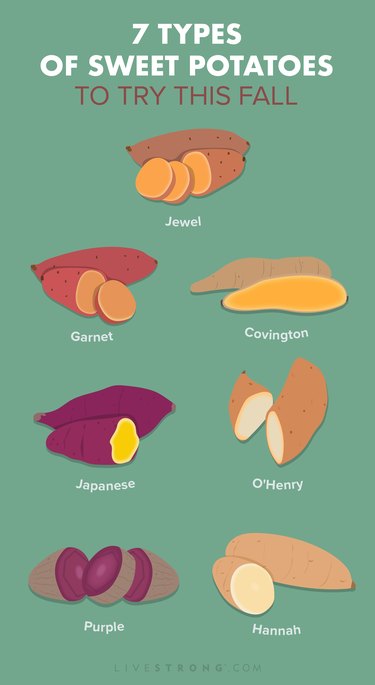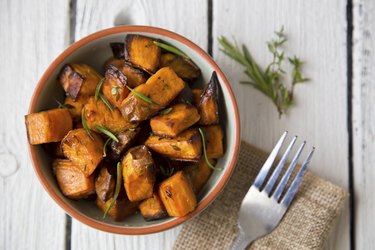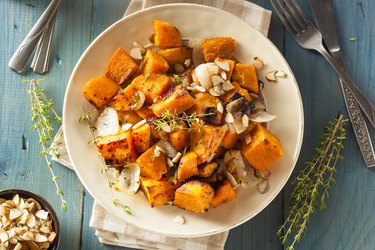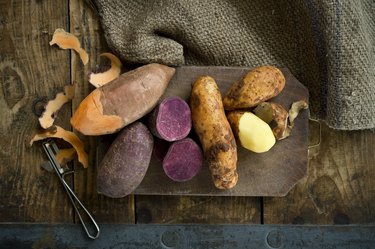
Sweet potatoes are full of nutrients like fiber and vitamin A, according to the USDA. The best part is that they are easy to find at your local grocery store, farmers' market and on many restaurant menus.
But there are several different types of sweet potatoes grown worldwide. They are generally starchy and slightly sweet, but range in shape, color and texture, each with its own unique taste profile.
Video of the Day
Video of the Day
While most sweet potato varieties are delicious and incredibly versatile, knowing what type you're dealing with can help you choose a cooking method and sweet potato recipe that may be better suited for that spud.
1. Jewel
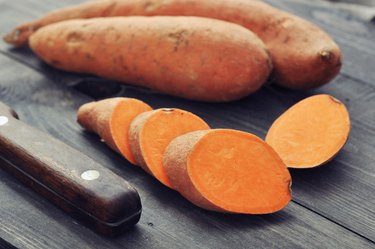
The Jewel variety is likely what you are used to seeing and eating when you think of a classic sweet potato. They have coppery skin that ranges from red to purple with deep orange flesh.
Jewels have a long elliptical shape, a mildly sweet taste and fairly firm texture and a lot of moisture, making them excellent all-purpose sweet potatoes.
Jewels are definitely a go-to variety for baking and casseroles, so pop these spuds in the oven whole or cut them in wedges, toss with olive oil, salt and pepper and roast them at 425 degrees Fahrenheit for 30 to 40 minutes until golden brown.
If you're looking for a little extra sweetness, use Jewels for sweet potato pie or a simple mash with cinnamon and maple syrup on top.
2. Garnet

Garnet sweet potatoes are high in moisture and have reddish to purplish skin with orange flesh. They taste less sweet and are more akin to winter squash with a heavy, pumpkin-like quality and flavor.
For these reasons, Garnet is best used for baking recipes, such as sweet potato pie or a casserole. Chef Julie Andrews, RD, tells LIVESTRONG.com that she searches high and low for Garnet sweet potatoes every winter specifically earmarked for her favorite sweet potato casserole recipe.
3. Covington
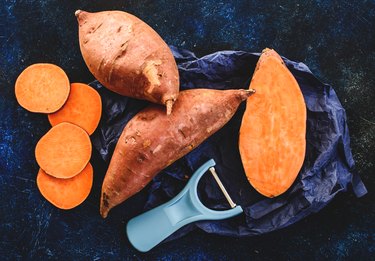
The Covington variety of sweet potato is particularly popular in the south. These sweet spuds account for nearly 85 percent of sweet potato production in North Carolina and are continuing to become more popular, according to North Carolina Sweet Potatoes.
Covingtons have a distinct rose-colored skin that is often speckled with small spots and super sweet firm, dense bright orange flesh that stays vibrant when cooked. They have tapered ends, a slight curve to the overall shape and are small to medium in size.
Covingtons have a moist and creamy texture with a malty sweet flavor when cooked. In the south, they're often favored for side dishes and desserts. They are delicious when baked, mashed, pureed or whipped.
Covingtons pair well with savory herbs like cilantro, parsley or rosemary, warming spices such as cinnamon, cumin and curry powder, and staples like garlic, ginger and onions.
4. Japanese
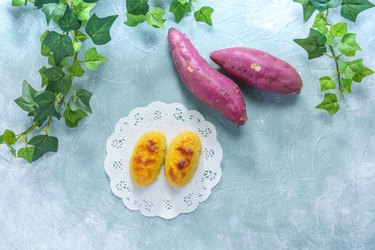
Japanese sweet potatoes are medium to large in size with a cylindrical, oblong shape and rounded tapered ends. The skin is often purple or red with a textured, semi-rough feel and some shallow eyes.
They have white flesh which tends to be dryer and starchier than other sweet potato varieties, with a slightly nutty, floral, sweet flavor.
The Japanese sweet potato is perfect for braising, boiling or stir-frying. Braising these taters, or cooking them low and slow, gives them a silky texture.
Japanese sweet potatoes are also great for gnocchi because they are low in moisture. Pair them with sauces that are bright and acidic, such as a salsa verde or chimichurri.
5. O'Henry
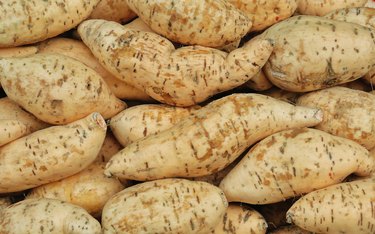
The O'Henry sweet potato is white on the inside like a regular potato, with thin, pale, reddish or tan skin.
When cooked, it is sweet, creamy, moist and dense, making it an ideal candidate for soups and stews. They can be used in both savory and sweet recipes, but are unsurpassed when baked, roasted or boiled.
Sweet potato fries, sweet potato pie or candied sweet potatoes are great ways to use O'Henrys. You can also try them pureed or mashed for soups, stews, sauces or a simple mashed side dish.
6. Purple

Purple sweet potatoes have a firm, meaty texture. They have purple skin and a subtly sweet-tasting flesh that intensifies in color when cooked.
These spuds are high in anthocyanins, which is the same antioxidant found in blueberries that gives both their purple hue, per the Institute of Physics (IOP).
Roasting, frying or sautéing purple sweet potatoes can help to keep that gorgeous color from bleeding out when cooking.
Andrews finds the purple variety to have a bit of a nutty taste, so she recommends roasting purple sweet potatoes whole and sprinkling with salt, pepper and turmeric. If you're looking to show off that beautiful purple hue, she suggests steaming them and pureeing them into a smoothie or soup.
7. Hannah
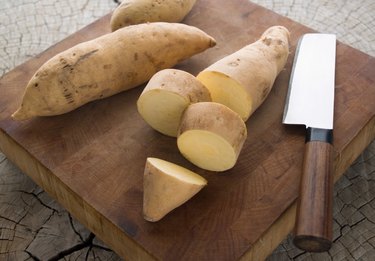
Hannah sweet potatoes have semi-smooth tan skin with shallow eyes, cream-colored flesh and a cylindrical, oblong shape with rounded tapered ends.
Their flesh is slightly sweet with a starchy texture that is similar to a traditional white potato but is very creamy and takes on a yellowish hue when cooked.
Andrews loves using Hannahs for a simple side of mashed sweet potatoes because their flavor is sweet enough — all you need is a little dab of butter. No added sugar, maple syrup or honey necessary!
Because Hannahs are quite firm, they also do well when used for gnocchi, baked into a casserole or sliced into wedges and fried. You can also slice and cook these tasty tubers on the grill, topping them with a simple herb dressing like minced cilantro, lime juice, olive oil, salt and pepper.
